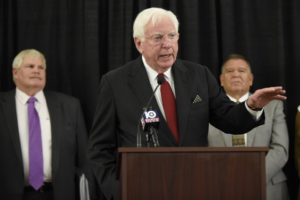My journalism career enabled me to cross paths with a lot of interesting, provocative and even great people over the length of its time. I want to include Ross Perot as being among the great individuals I had the pleasure to meet.
Perot died today of leukemia. He was 89 years of age. He died peacefully in Dallas, where he built his fortune and lived most of his adult life.
He wouldn’t have remembered me had anyone thought to ask. But I surely remember the time I had the pleasure of meeting him and visiting with him about one of his pet issues in that moment: the quality of public education.
He had mouthed off about how Texas was more interested in producing blue-chip athletes than blue-chip students. The Texas governor at the time, the late Mark White, challenged Perot to craft a better education system for Texas. Perot took up the challenge and led the Perot Commission to create a system that set certain achievement standards for all Texas public school students.
He then launched a statewide barnstorming tour to pitch his findings to business leaders, politicians, civic leaders and, yes, media representatives; I was among the media types Perot met.
He came to Beaumont and delivered a stemwinder of a speech to a roomful of the city’s movers and shakers.
As an editorial writer and editor for the Beaumont Enterprise, I had the high honor of meeting later with Perot along with other media reps at Lamar University.
That was in 1984. Little did we know at the time he would become a political force of nature as well, running for president twice in 1992 and 1996. At one time prior to the 1992 fall election, Perot actually led public opinion polling that included President George H.W. Bush and a young Arkansas governor, Bill Clinton.
He finished third that year. Clinton got elected. Bush served his single term and disliked Perot for the rest of his life, blaming him for losing the 1992 election to Bill Clinton. President Bush is gone now, but my own view is that Perot — contrary to popular notions — did not deprive a chance at re-election. He took roughly the same number of votes from both Bush and Clinton, meaning that Bill Clinton was going to win the election anyway.
Still, Ross Perot was a player, although he was prone at times to acting a little squirrely. He also was a patriot who loved his country and gave back many millions of dollars of his immense personal wealth to make his community and country better.
I am grateful beyond measure that his path crossed mine if only for a brief moment in time. Take my word for it, this man made a serious impression on those he met along the way.


